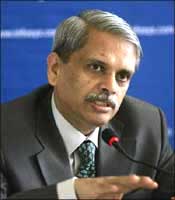On the back of one of the worst global economic slowdowns, most Indian IT services companies have been experimenting with their client focus and sales strategies.
 Infosys Technologies, India's second-largest, for instance, has been sharpening its focus on certain geographies, as well as carving out new business verticals. The company has also been strengthening its front-end delivery capabilities and combating the phenomenon of vendor consolidation by larger clients.
Infosys Technologies, India's second-largest, for instance, has been sharpening its focus on certain geographies, as well as carving out new business verticals. The company has also been strengthening its front-end delivery capabilities and combating the phenomenon of vendor consolidation by larger clients.
S (Kris) Gopalakrishnan, CEO and managing director of the Bangalore-headquartered Infosys, spoke to Bibhu Ranjan Mishra and Ravi Menon on why Infosys and the industry expect a better future. Excerpts:
How do you view the business environment now?
We are definitely seeing signs of recovery. We are seeing customers becoming more confident and they are even willing to discuss discretionary projects. However, my take on this is that we will have to wait for at least two quarters of data to ascertain whether the recovery is real and sustainable before we can say that we are completely out of the woods.
What is the direction that IT spending will take this year?
IT spending is definitely expected to be lower this year - it is expected to be down 6-10 per cent. Next year, we expect it to be flat at this point. However, it is still quite early to predict next year's cycle.
What's happening on the hiring front? Aren't you hiring more overseas than in India?
We shall continue to hire overseas. But we will push hiring in India also. We will take a relook at hiring of freshers in January next year, based on the growth rate at that point of time. You also need to remember that there is excess capacity today, which we need to utilise first.
Our utilisation in the last quarter was only about 70 per cent, excluding training. Normally, it should be at around 78-79 per cent. So, we definitely see scope for improvement.
The slowdown appears to have made clients quite cautious. They are now talking about vendor consolidation...
Many large deals being discussed in the market currently are pointing to vendor consolidation. Suppliers (clients) are reducing their vendors and going in for rebidding of contracts. Deals being discussed today are of the same size but are eventually being given to fewer vendors. So, it's really about consolidation, and whoever retains it will see larger volumes.
Could you indicate how many firms are talking about consolidating their IT vendor base?
The larger ones, those with significant investment in India, are definitely looking at consolidation. Vendor consolidation benefits both sides. Customers benefit by giving the vendors higher work volumes and eliciting higher discounts. And we benefit because this gives us higher volumes and better visibility.
Is this confined to any particular sector?
No. But vendor consolidation definitely favours the larger companies.
Would you think this will favour the global giants like IBM and Accenture?
All I can say is that Indian companies are doing well.
Now that the industry is headed for a recovery, are you planning any change in policy - become more aggressive?
Our aggression and desire to grow has not reduced. It is just that the environment today is different, that's why growth has declined. We have been expanding our market even in a negative economic environment, and looking at new industry segments to go after - government, healthcare, energy and utilities.
Geography-wise, has there been a shift in focus, especially during the slowdown?
The US and Europe are still large markets for us. We are doing extremely well in certain other markets too. But since our revenue base from these markets is small, it won't have an impact right now. That said, the markets we are excited about are India, West Asia, South and Latin America, Japan and Australia. We are investing proactively in all these markets.
How does the Indian domestic IT services market look at this point of time?
Among emerging geographies, India is doing very well. The growth is primarily being driven by the government, which is spending a significant amount of money on e-governance projects. Over time, we would like India to become a billion-dollar market for us.






